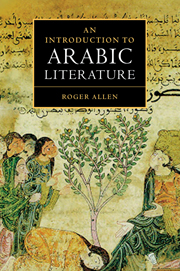Book contents
- Frontmatter
- Contents
- Preface
- Note on translation, transliteration, and further reading
- Chronology
- 1 An essay on precedents and principles
- 2 The contexts of the literary tradition
- 3 The Qurʾān: sacred text and cultural yardstick
- 4 Poetry
- 5 Belletristic prose and narrative
- 6 Drama
- 7 The critical tradition
- Guide to further reading
- Index
1 - An essay on precedents and principles
Published online by Cambridge University Press: 05 June 2012
- Frontmatter
- Contents
- Preface
- Note on translation, transliteration, and further reading
- Chronology
- 1 An essay on precedents and principles
- 2 The contexts of the literary tradition
- 3 The Qurʾān: sacred text and cultural yardstick
- 4 Poetry
- 5 Belletristic prose and narrative
- 6 Drama
- 7 The critical tradition
- Guide to further reading
- Index
Summary
In this chapter I will make use of several of the terms found in the title and subtitle as conduits for a brief discussion of the book's aims and methods.
‘Arabic’ announces clearly the language in which the literary materials that constitute my primary topic have been composed, but the dual significance of the Arabic equivalent of that adjective, ‘'arabī’ – referring to both a language and its people – also introduces the notion that this work will be one of ‘translation’ in the most literal sense: I will be attempting to ‘carry’ one literary tradition ‘across’ cultural boundaries into the milieu of English-speaking readers at the onset of the twentyfirst century and, more particularly, the comparative framework of world literature studies. For most of the period under consideration (the sixth century ce till the present), the relationship between the Arab-Islamic world and the West has been one of almost continuous confrontation, with a concomitant and anticipatable obfuscation of some unpleasant truths on both sides. The Crusades and the reconquest of Spain leading to the fall of Granada in 1492, for instance, both of them traditionally recounted as glorious episodes in the history of Western Europe, take on a quite different significance if viewed from outside such a context. With this background in mind, it is the purpose of the second chapter of this book to provide an environmental, linguistic, and historical context for a series of discussions of the literary genres in Arabic.
- Type
- Chapter
- Information
- An Introduction to Arabic Literature , pp. 1 - 6Publisher: Cambridge University PressPrint publication year: 2000

